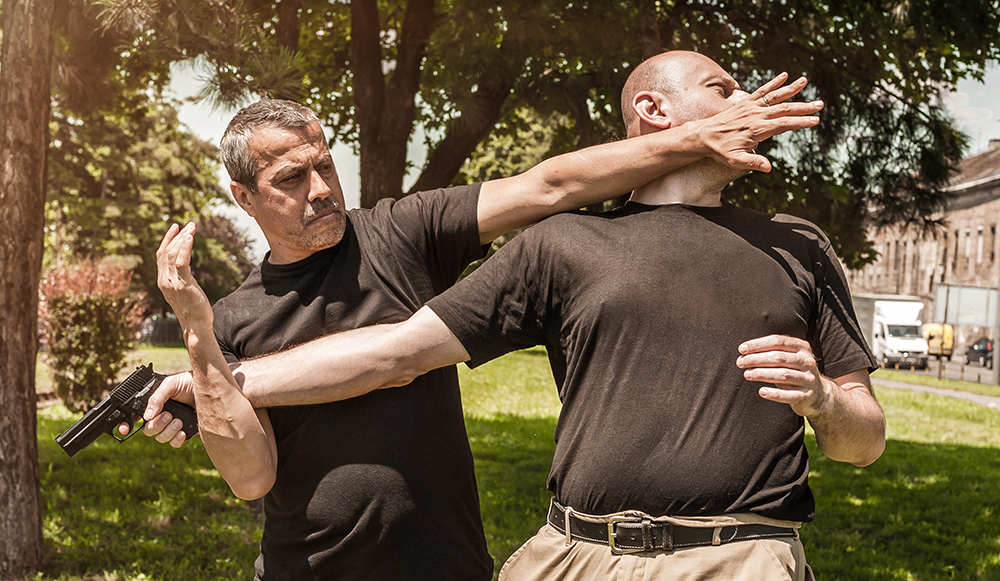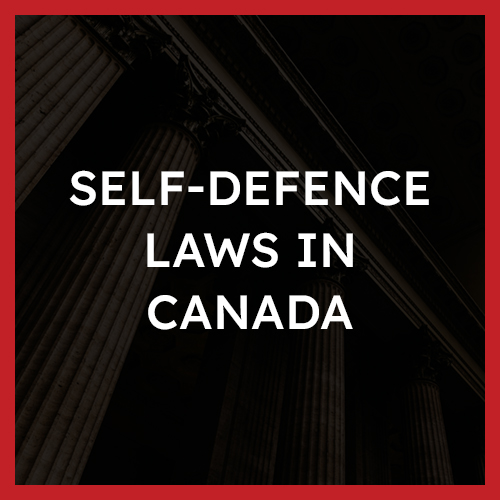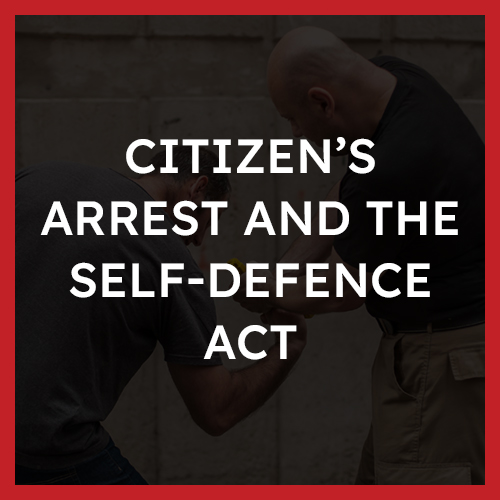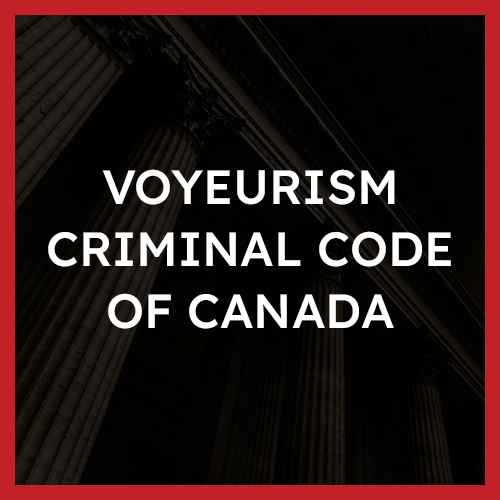Self-Defence Laws in Canada: Explained By A Lawyer
Canadian citizens have a fundamental right to safeguard themselves and their property, and this right must be upheld as long as their defensive actions are reasonable and proportional to the circumstances. However, it is crucial to note that injuring an intruder or using lethal force is only justified when it is the only available option for self-defence against a perceived threat of severe bodily harm or loss of life.
Any actions taken beyond what is deemed reasonable and necessary will not be condoned by the law. In essence, Canadians have the right to use force to protect their homes and themselves, but only to the extent that is reasonable and necessary.

Can I Defend Myself in Canada?
Under s.34 of the Criminal Code a person is permitted to take reasonable action to protect themselves or others without being guilty of an offence.
The relevant code states:
(1) A person is not guilty of an offence if
(a) they believe on reasonable grounds that force is being used against them or another person or that a threat of force is being made against them or another person;
(b) the act that constitutes the offence is committed for the purpose of defending or protecting themselves or the other person from that use or threat of force; and
(c) the act committed is reasonable in the circumstances.

Once it has been satisfied that there is an air of reality to the defence, in order to successfully raise a defence of self-defence it must be proven, on a balance of probabilities, that:
- you believed, on reasonable grounds, that a force, or a threat of force, was being used against them or another person;
- you acted for the purposes of defending yourself or others from that use of force or threat of force; and
- your act, purportedly committed in self-defence, was reasonable in the circumstances.
The court in Khil, further stated that if there are no reasonable grounds for the force being used against an individual, the defence of self-defence cannot be triggered. However, the Court in R v Humphrey, 2007 CanLII 59379 (ON SC) confirmed that the doctrine of mistake is applicable to section 34(1) of the Criminal Code.
This means that an accused’s belief that he was in imminent danger from an attack may be reasonable although he may be mistaken in his belief. As such, reasonable mistakes will not defeat a self-defence claim.
With respect to whether you subjectively had a defensive purpose, the case of R v Parker (2013), ONCJ 195 (CanLII) indicated that any use of force for a purpose other than to repel force will not be lawful.
This means that if your purpose was to seek vengeance, visit punishment, or vindicate honour against the person who used or threatened to use force against you, you will not be able to successfully raise this defence.
In deciding whether your response was objectively reasonable, s.34(2) of the Criminal Code provides a non-exhaustive list of factors which aid in determining whether the accused’s act was reasonable in the circumstances. As indicated in Khil the third requirement is not solely an objective test and the trier of facts must consider how the accused perceived the relevant facts and whether that perception was reasonable.
The factors that should be taken into consideration, but are not limited to include:
- The nature of the force or threat;
- The extent to which the force was imminent and whether there were other means available to respond to that potential use of force;
- The person’s role in the incident;
- Whether any party to the incident used or threatened to use a weapon;
- The size, age, gender and physical capabilities of the parties to the incident;
- The nature and proportionality of the person’s response to the use or threat of force; and
- Whether the act was committed in response to a use or threat of force that the person knew was lawful.
It is important to note that a self-defence claim against a police officer will generally be unsuccessful unless you are able to showcase that you had reasonable grounds to believe that the law enforcement officer was acting unlawfully.
Understanding the Citizen’s Arrest and the Self-Defence Act

Before the Act was enacted, it only allowed citizens to arrest people who were found guilty of a criminal offence. However, under s.494 of the Criminal Code it is now legal for you to apprehend individuals who have committed a crime. However, it is important to note that there are certain limitations that prevent citizens from making arrests.
If you think that a person is committing a crime, instead of acting on your own, report it to the police.
Since the police are well-equipped to handle such situations, citizens can make an arrest within a certain time frame. However, it is important to note that before you utilize this power of arrest you must possess reasonable grounds that made you believe that it is not feasible in the circumstances for the arrest to be made by a police officer.
In most cases, finding a person committing a crime or escaping from law enforcers who have the authority to apprehend them is the only way to make an arrest. However, if you are planning on arresting someone for an indictable offence, you only have the authority to make the arrest if you are at the location where the person is committing the crime.
Additionally, unless the offence is related to your property, it is illegal to arrest a person after they have already committed an indictable offence.
However, in certain circumstances, regardless of the type of criminal offence that is committed on or in relation to your property, you may be able to do one of the following:
- arrest a person who is in the act of committing a crime; or
- after the person has committed the crime, arrest them within a reasonable period of time.
Additionally, in order to make a citizen’s arrest for a crime that is on or in relation to your property, the eligibility criteria for doing so is as follows:
- You must be the owner of the property;
- in lawful possession of the property; or
- have been authorized by the owner or the person in lawful possession of the property.
Law enforcers are permitted to use as much force as needed to apprehend citizens if they have reasonable grounds for doing so. However, since law enforcers have to use force in a certain way, they are also responsible for any excess force they use. This means that you not only may be criminally liable for your actions, but you may also face a civil lawsuit for injuries or conduct that you caused.
It is also important to note that when making a citizen’s arrest, the person being arrested must be handed over to the police immediately without any delay. If you fail to do so, in certain situations, your citizen’s arrest may be deemed illegal. In these situations, you could face civil or criminal consequences.
The Citizens Arrest and Self Defence Act Amendments
The Citizens Arrest and Self Defence Act introduced new amendments to the previous self defence legislation.
Under this new legislation, if a person reasonably believes that either they or another person is being threatened with force and that person proceeds to take actions that are for the purpose of defending against that force they reasonably believe will be used against them, then they cannot be found guilty of the offence.
However, it is important to note that the courts will consider whether the use of force used by the individual could be considered reasonable under the circumstances.
In deciding whether the specific action in question is reasonable, the courts will take into consideration s.34(2) of the Criminal Code which provides a non-exhaustive list of factors that help determine whether or not your actions can be considered reasonable in the circumstances.
These factors include, but are not limited to, the following:
- the nature of the threat;
- how the person responded;
- proportionality;
- how imminent the threat was;
- other available means to respond;
- any weapon involvement;
- the size, age, gender and physical capabilities of the people involved; and
- the relationship between the people involved.

What is Defence of Property?
Under s.35 of the Criminal code:
(1) A person is not guilty of an offence if
(a) they either believe on reasonable grounds that they are in peaceable possession of property or are acting under the authority of, or lawfully assisting, a person whom they believe on reasonable grounds is in peaceable possession of property;
(b) they believe on reasonable grounds that another person
(i) is about to enter, is entering or has entered the property without being entitled by law to do so,
(ii) is about to take the property, is doing so or has just done so, or
(iii) is about to damage or destroy the property, or make it inoperative, or is doing so;
(c) the act that constitutes the offence is committed for the purpose of
(i) preventing the other person from entering the property, or removing that person from the property, or
(ii) preventing the other person from taking, damaging or destroying the property or from making it inoperative, or retaking the property from that person; and
(d) the act committed is reasonable in the circumstances.
The case of R v Cormier, [2017] NBCA 10 (CanLII) indicated that s.35 applies to a wide range of offences and to any type of property.
The defence of property is engaged when you have a reasonable belief of peaceful possession of property and another individual’s specific actions are threatening your property. As such, if you are able to successfully raise a defence of property, any act that is committed to defending the property is justified, given that act is reasonable in the circumstances.
The courts have interpreted the concept of “peaceable possession” to mean possession that is not likely to lead to a breach of the peace. This means that this defence is limited to circumstances where it is deemed appropriate.
Based on the wording of s.35 of the Criminal Code, in order for a defence of property to be raised successfully four requirements must be proven, on a balance of probabilities, by the defence:
- There was peaceful possession;
- There was a threat to property;
- You had a purpose of protecting the property; and
- Your response was reasonable.
For the purposes of s.35(1)(a) it is not required that you were actually in peaceful possession of property. Rather, what is required is that you have a reasonable belief that you are in peaceful possession of property or that you are assisting someone who you reasonably believe is in peaceful possession of the property.
In relation to s.35(1)(b), there must be present a threat to the property in any specified way. These specified ways include either by way of trespass, theft, or vandalism.
Regarding the “purpose”, in respect to s.35(1)(c), the courts will assess this requirement subjectively to determine whether your purpose was to prevent a trespasser from entering or to remove a trespasser after entry, to retake property, or to prevent property damage.
However, in deciding whether your response was reasonable in the circumstances is an inquiry that the court will determine objectively.
It is also important to note that, similar to self-defence, a claim of defence of property against the police, is only available where you believe that the police are acting unlawfully. You may also not rely on the defence of property if the other person is legally entitled to the possession of property.

How Can I Defend Myself?
You may defend yourself from force or a threat of force by any means which are reasonable.
As mentioned above, for self-defence claims the court will take into account the factors listed in s.34(2) of the Criminal Code to determine whether or not the force used was reasonable. However, for the purposes of successfully raising a defence of property, there is no list of factors that the court will take into consideration, rather, the court will look at the force you used objectively to decide whether or not it was reasonable.
Can I use a weapon?
Yes, however, the use of a weapon in defending yourself can only be used to defend yourself from a threat, or a force of threat, that you reasonably believed would be used against you.
This means that if you are in a situation where you reasonably believe there is a force, or a threat of force, that will be used against you, and you use a weapon to defend yourself from that force it may be acceptable. However, buying weapons for the purpose of using them in situations where you do not have a defensive purpose is not legal.
Additionally, in relation to firearms, the use of firearms is generally prohibited for the defence of self or property.
Can I use lethal force?
Yes, under s.34 and s.35 of the Criminal Code, you are permitted to defend yourself or your property.
However, you are only able to do so if your defensive actions are deemed reasonable under particular circumstances. What this means is that you are permitted to use force that is needed to protect yourself or prevent someone from entering the property, but nothing more.
In the case of using lethal force, it will depend on the circumstances of your particular case and whether given those circumstances the use of lethal force can be deemed as reasonable force.
Frequently Asked Questions
What is a citizen’s arrest?
A citizen’s arrest is an arrest that is made by an ordinary citizen. This means that the person making the arrest is not in any way acting in the capacity of a police officer.
What can I do during a citizen’s arrest?
During a citizen’s arrest, you should try to avoid using force or keep it at a minimum if absolutely necessary. You should inform the suspect that you are making a citizen’s arrest, explicitly ask for the suspect’s cooperation and inform them that you are holding that individual until the police arrive. The purpose of the citizens’ arrest is to only temporarily detain the suspect until the police arrive.
What is reasonable force?
Reasonable force would be any force that is used for the purpose of defending ourselves from a force, or a threat of force, that we reasonably believed would be used against us.
This means that reasonable force would be force that is solely used for the purpose of defending and protecting yourself from any harm. The courts will take into consideration factors that are listed in s.34(2) of the Criminal Code when determining whether the force you used was reasonable for claims of self-defence.
Can I be charged with assault or manslaughter for defending myself?
Yes, you can be charged with assault or manslaughter even in cases for defending yourself.
However, self-defence and defence of property are legitimate defences to such charges. If you are able to showcase that you used reasonable force to defend yourself from a force, or a threat of force, that you reasonably believed was going to be used against you a self-defence or defence of property claim may be able to successfully rid you of any liability.
Contact Us
If you have been charged with a criminal offence, visit our location pages to contact our team.
About The Author
Ask A Question
We endeavor to respond to questions within 24 hours. If your matter is urgent, please call our office or submit a request for a free consultation.







